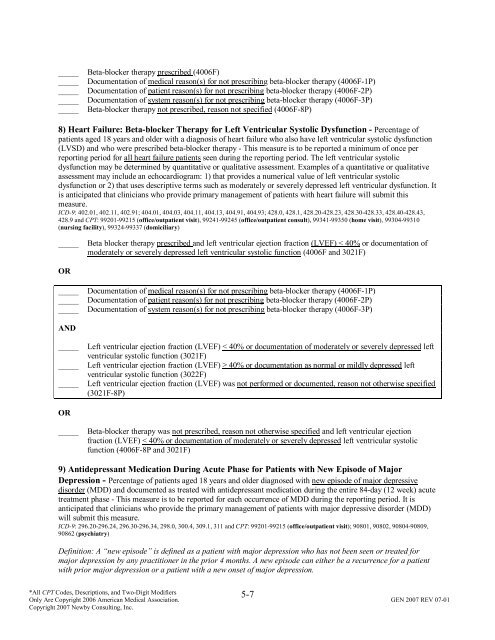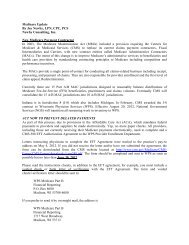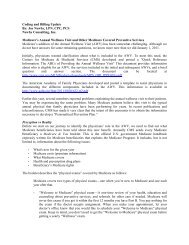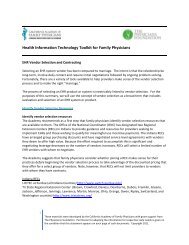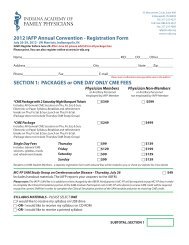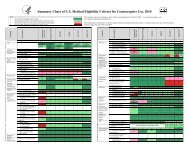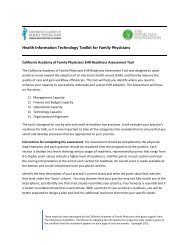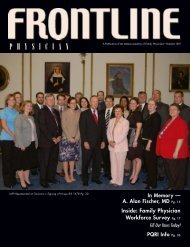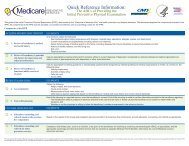pqri measure coding and reporting principles - Indiana Academy of ...
pqri measure coding and reporting principles - Indiana Academy of ...
pqri measure coding and reporting principles - Indiana Academy of ...
You also want an ePaper? Increase the reach of your titles
YUMPU automatically turns print PDFs into web optimized ePapers that Google loves.
_____<br />
_____<br />
_____<br />
_____<br />
_____<br />
Beta-blocker therapy prescribed (4006F)<br />
Documentation <strong>of</strong> medical reason(s) for not prescribing beta-blocker therapy (4006F-1P)<br />
Documentation <strong>of</strong> patient reason(s) for not prescribing beta-blocker therapy (4006F-2P)<br />
Documentation <strong>of</strong> system reason(s) for not prescribing beta-blocker therapy (4006F-3P)<br />
Beta-blocker therapy not prescribed, reason not specified (4006F-8P)<br />
8) Heart Failure: Beta-blocker Therapy for Left Ventricular Systolic Dysfunction - Percentage <strong>of</strong><br />
patients aged 18 years <strong>and</strong> older with a diagnosis <strong>of</strong> heart failure who also have left ventricular systolic dysfunction<br />
(LVSD) <strong>and</strong> who were prescribed beta-blocker therapy - This <strong>measure</strong> is to be reported a minimum <strong>of</strong> once per<br />
<strong>reporting</strong> period for all heart failure patients seen during the <strong>reporting</strong> period. The left ventricular systolic<br />
dysfunction may be determined by quantitative or qualitative assessment. Examples <strong>of</strong> a quantitative or qualitative<br />
assessment may include an echocardiogram: 1) that provides a numerical value <strong>of</strong> left ventricular systolic<br />
dysfunction or 2) that uses descriptive terms such as moderately or severely depressed left ventricular dysfunction. It<br />
is anticipated that clinicians who provide primary management <strong>of</strong> patients with heart failure will submit this<br />
<strong>measure</strong>.<br />
ICD-9: 402.01, 402.11, 402.91; 404.01, 404.03, 404.11, 404.13, 404.91, 404.93; 428.0, 428.1, 428.20-428.23, 428.30-428.33, 428.40-428.43,<br />
428.9 <strong>and</strong> CPT: 99201-99215 (<strong>of</strong>fice/outpatient visit), 99241-99245 (<strong>of</strong>fice/outpatient consult), 99341-99350 (home visit), 99304-99310<br />
(nursing facility), 99324-99337 (domiciliary)<br />
_____<br />
Beta blocker therapy prescribed <strong>and</strong> left ventricular ejection fraction (LVEF) < 40% or documentation <strong>of</strong><br />
moderately or severely depressed left ventricular systolic function (4006F <strong>and</strong> 3021F)<br />
OR<br />
_____<br />
_____<br />
_____<br />
Documentation <strong>of</strong> medical reason(s) for not prescribing beta-blocker therapy (4006F-1P)<br />
Documentation <strong>of</strong> patient reason(s) for not prescribing beta-blocker therapy (4006F-2P)<br />
Documentation <strong>of</strong> system reason(s) for not prescribing beta-blocker therapy (4006F-3P)<br />
AND<br />
_____<br />
_____<br />
_____<br />
Left ventricular ejection fraction (LVEF) < 40% or documentation <strong>of</strong> moderately or severely depressed left<br />
ventricular systolic function (3021F)<br />
Left ventricular ejection fraction (LVEF) ≥ 40% or documentation as normal or mildly depressed left<br />
ventricular systolic function (3022F)<br />
Left ventricular ejection fraction (LVEF) was not performed or documented, reason not otherwise specified<br />
(3021F-8P)<br />
OR<br />
_____<br />
Beta-blocker therapy was not prescribed, reason not otherwise specified <strong>and</strong> left ventricular ejection<br />
fraction (LVEF) < 40% or documentation <strong>of</strong> moderately or severely depressed left ventricular systolic<br />
function (4006F-8P <strong>and</strong> 3021F)<br />
9) Antidepressant Medication During Acute Phase for Patients with New Episode <strong>of</strong> Major<br />
Depression - Percentage <strong>of</strong> patients aged 18 years <strong>and</strong> older diagnosed with new episode <strong>of</strong> major depressive<br />
disorder (MDD) <strong>and</strong> documented as treated with antidepressant medication during the entire 84-day (12 week) acute<br />
treatment phase - This <strong>measure</strong> is to be reported for each occurrence <strong>of</strong> MDD during the <strong>reporting</strong> period. It is<br />
anticipated that clinicians who provide the primary management <strong>of</strong> patients with major depressive disorder (MDD)<br />
will submit this <strong>measure</strong>.<br />
ICD-9: 296.20-296.24, 296.30-296.34, 298.0, 300.4, 309.1, 311 <strong>and</strong> CPT: 99201-99215 (<strong>of</strong>fice/outpatient visit); 90801, 90802, 90804-90809,<br />
90862 (psychiatry)<br />
Definition: A “new episode” is defined as a patient with major depression who has not been seen or treated for<br />
major depression by any practitioner in the prior 4 months. A new episode can either be a recurrence for a patient<br />
with prior major depression or a patient with a new onset <strong>of</strong> major depression.<br />
*All CPT Codes, Descriptions, <strong>and</strong> Two-Digit Modifiers<br />
Only Are Copyright 2006 American Medical Association. GEN 2007 REV 07-01<br />
Copyright 2007 Newby Consulting, Inc.<br />
5-7


